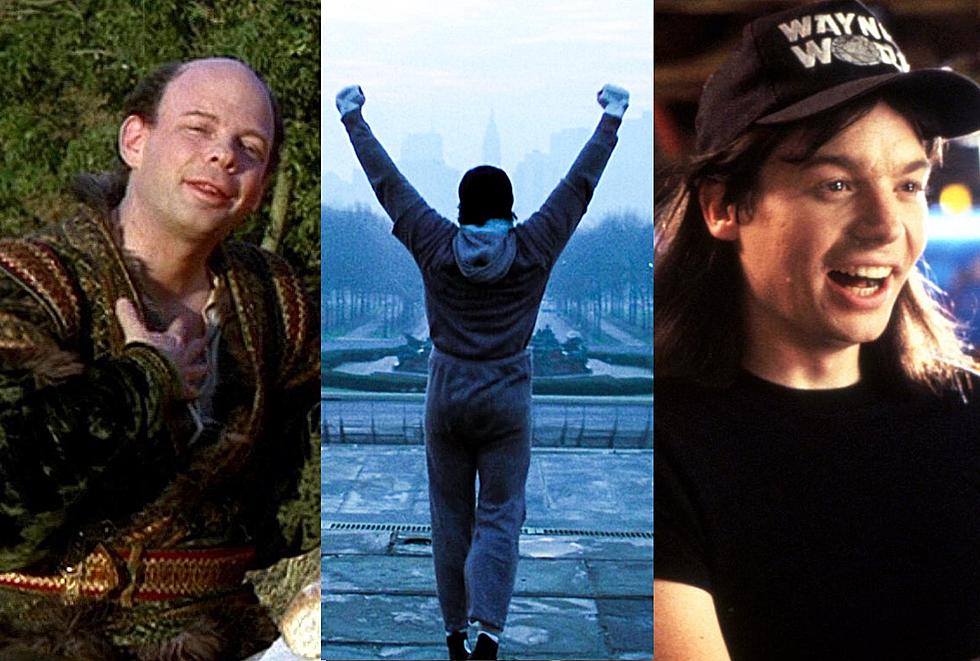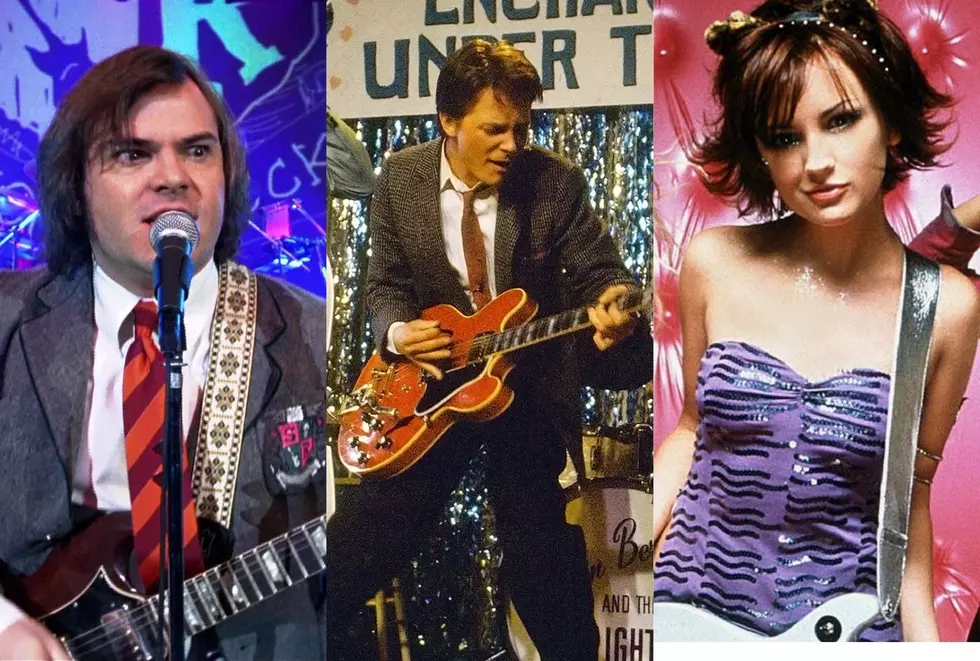
Rob Reiner Explains Why There’s No Such Thing as a ‘Rob Reiner Movie’
"It's a product of a very, very confused, twisted mind," jokes Rob Reiner when he's asked why it's so hard to peg him as a filmmaker. When you hear the name Martin Scorsese associated with a film (whom Reiner worked with in last year's 'The Wolf of Wall Street'), there's a fairly clear picture of what the tone of that movie might be like. But, with Reiner, it's almost impossible. This is the man who directed 'This is Spinal Tap,' 'Stand By Me,' The Princess Bride,' 'When Harry Met Sally' and 'A Few Good Men' -- some of the most beloved films ever made, and films that couldn't be more different.
Well, that's not entirely true, at least if you listen to Reiner's explanation (which has a lot to do with relationships, particularly fathers and sons, emulating his relationship with his own father, the legendary Carl Reiner). We took four separate swaths of Reiner's career, and the filmmaker went on to explain what his mindset was as he went from, say, 'The Princess Bride' to 'When Harry Met Sally' to 'Misery.' Culminating with his last few films, including his most recent, 'And So It Goes' -- starring Michael Douglas and Diane Keaton, both burying their personal baggage to find love later in life -- which all do have death as a recurring theme. Here is Reiner in his own words:
'This is Spinal Tap' → 'The Sure Thing' → 'Stand By Me'
"'This is Spinal Tap,' to me, was comfortable. I felt comfortable. Because satire was something I've felt very comfortable in and I'd been in The Committee and I'd been in my own improv group and I had done a lot of that stuff. And improvisation was all what I felt comfortable doing. So, doing 'The Sure Thing' -- which, also I related to the whole idea of learning about how sex can be connected to love, which is the same story I tell over and over again with men and women. It's that thing that I feel, which is women are just more evolved. They're more mature, always, for all stages of life. So, a guy having to find that out and understand that and it's something that I've been having to find out my whole life, that women are more evolved. And they do know what's more important in life than men do. So, when that came to me, I went, Oh, yeah, this makes sense. I get this. This is not like some teen sex comedy. This is about a boy trying to understand that sex and love can be connected. And girls understand that already. They understand it already, before they start. They're born understanding that and boys have to figure that out. So, I liked the theme of that. And it was more nerve-wracking for me to do that film than it was to do 'Spinal Tap,' because I was comfortable with improvisation, but with traditional film and where to put the camera and all that stuff? It was harder.
"'Stand by Me' was the first time I actually did a movie that was a complete extension of my own personality, where I had a real personal thing in the movie. I mean, satire, which I certainly love -- my dad did satire on 'Show of Shows.' 'The Sure Thing' was a romantic comedy, and my dad had done a number of those with Doris Day and then so on. So, this film, 'Stand By Me,' had a melancholy side to it, it had a humorous side to it and it really was a reflection of my personality and my sensibility. So, when I got this and looked at it, there's great writing here and some wonderfully observed characters and some great dialogue that Stephen King had written. But I said, 'What is this? How do I get into this? Where's my way into this story?' And, then, I realized that Gordy -- who, in the book, was more of an observer -- I said, this is going to be a story about Gordy. It's about Gordy not thinking very highly of himself, thinking that his father didn't love him and thinking that he hadn't cried at his brother's funeral. He was sitting on all of these feelings and that's why he needed to go see the body. So it was a journey of self discovery that he needed to do this.
"And, so, even though I was in my 30s at the time, this was my weird artistic coming-of-age, in a weird way. It was like, OK, this is what I like. This is who I am. And it was risky because I thought if they don't like it, they're basically going to reject me, because this is the way I thought of this very sensitive boy who thought his father didn't like him. So, the scene where they're at the log and the boy says, 'My dad, he doesn't love me,' and River Phoenix says, 'No, he just doesn't know you. Your dad loves you, he just doesn't know you.' And I wrote that scene by myself in my hotel room when we were up in Oregon and I start crying as I'm writing that scene. Because those are feelings that I had when I was a little kid growing up. So, it was very personal, even though it's Stephen King's story and those things."
'The Princess Bride' → 'When Harry Met Sally' → 'Misery'
"I have a lot of things that I think about. I love satire, I love romance, comedy, drama -- I like all these things and I try to find ways to make movies that I can use as many of these elements as possible and to put that all together. I think the best one that used all of them was 'The Princess Bride.' Because it's a very oddball thing where we have this kind of traditional fairytale swashbuckling adventure story, but at the same time, it's a romance. At the same time, there's a satirical element where you're kind of poking fun of it. So, I like finding ways of taking all of those things and putting them together.
"'The Princess Bride' is kind of an anomaly, because I was a huge William Goldman fan and 'Princess Bride' was my favorite book of all time. I love that book and I read it when I was in my 20s, so, I wanted to do that and I didn't have any kind of personal connection to it except for the fact that I loved the combination of satire and romance and humor. All of that.
"'When Harry Met Sally' came out of my life experience, which is I'd been married for 10 years and then I was single for 10 years and I was making a complete and utter mess of my social life and getting in and out of relationships -- and trying to figure out how men and women could be together. You know, did sex always come into the picture? And, if it did, did it ruin friendships? All of that stuff was going on and that became the fodder for that film. So, it was not like I wanted to change a genre or something else, it was just an extension of what I was going through at that time.
"'Misery' is a 180 in terms of the genre, but, again, it was something I completely connected with because I understood that main character of Paul Sheldon was feeling trapped by his own success and feeling like if he broke away and did something else, his fans would get very angry with him. Well, here's the thing, the time that I harken back to was when I was doing 'All in the Family' and the series was over, they gave me offers of tons of money to continue doing that character as a spinoff with Sally Struthers. And I had wanted to be a director. I had wanted to be a director before that and, at the time, they didn't accept television people in the movies. We were like second class citizens where people would look down on us. I knew what it was like to be pigeonholed -- people didn't want me to do that and it was a real struggle for me. So, I could relate to that character, even though it was in the context of a thriller. First of all, my favorite form of all movies is thrillers. I love them more than anything. I don't make them, but I love them. Yeah, I did make one, but for me to make one, I love Hitchcock, I've seen all of Hitchcock's films and I had to watch them all again to understand the grammar of a thriller. You know, the film grammar of a thriller. But, to me, what drew me to the story was what Paul Sheldon was going through -- not so much, Oh, let's make a thriller."
'A Few Good Men' → 'North' → 'The American President'
"I had the ability to make the films I wanted to make because I had Castle Rock ... 'A Few Good Men,' and then 'North' and then 'The American President.' But all of those films were films I made at my company that I wanted to make. And I had a way into all of those projects. I mean, 'A Few Good Men' was about a guy whose father was a big famous lawyer and he didn't feel he could match up to him and he never tried a case because he was scared to go there. And, of course, he comes into his own where he not only tries a case, but he puts this guy on the stand and it was like his coming out.
"And 'North,' to me, my good friend Alan Zweibel had written this book and I looked at it and I went, Every single kid that I knew, at some point, thought about what would life be like with different parents. Would it be better? And I just thought, hey this is a little fable. I wasn't thinking of the pictures I made and the pictures I'm going to make, or any of that stuff. But the critics! Roger Ebert said, 'I hated this movie!' Seven times! He said 'hated' seven times. And I'm thinking, that's because Roger Ebert wanted me to do something. He wanted me to do something that I didn't do for him. So, I wanted to make this little fable -- this little kind of quirky fable about a boy whose questioning if he could have different parents. That fantasy that kids have at all times. So, I liked that."
'The Bucket List' → 'Flipped' → 'The Magic of Belle Isle' → 'And So It Goes'
"Well, [death has been a theme] because when I turned 60, I realized at that point I'm a very, very, very, very young old person. And all of those cliches about life being precious and being finite and you have to embrace every moment -- I started internalizing that. And, so, the movies that started getting drawn to were about taking every moment. 'The Magic of Belle Isle' is about living every moment, finding something good about your life. And the same thing with 'And So It Goes,' it's the same theme, basically: Live until it's over. And when it's over, this may be it, so, you'd better embrace the time you have."
Mike Ryan has written for The Huffington Post, Wired, Vanity Fair and GQ. He is the senior editor of ScreenCrush. You can contact him directly on Twitter.
More From ScreenCrush









